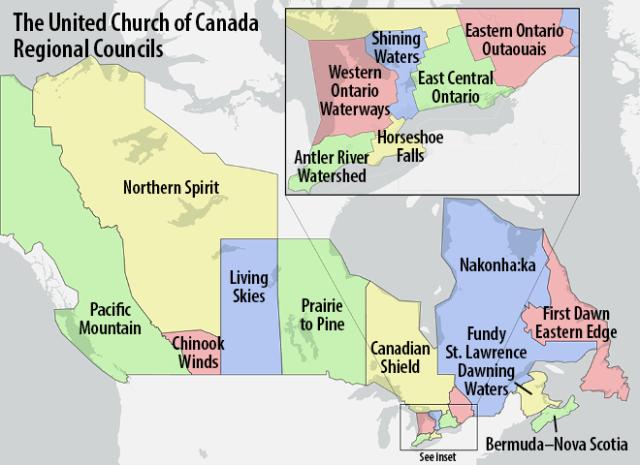
Congregations, Ministries, and Communities of Faith
Over 1 million people worship in about 2,500 congregations across Canada (plus three in Bermuda). Pastoral care is provided to about 271,000 known households. The United Church also supports community and social justice ministries, camps, campus ministries, chaplaincies (armed forces, hospitals, correctional), seniors homes, theological schools, education centres, and new expressions of ministry.
A community of faith is any community of people within the United Church that
- gathers to explore faith, worship, and serve
- is recognized as a community of faith within the United Church by the regional council through a covenantal relationship between the community of faith and the regional council
Many kinds of communities of people may be recognized as communities of faith: congregations, pastoral charges, outreach ministries, chaplaincies, faith-based communal living, house churches, online communities, and others.
Communities of faith may be time-limited, transitional, or ongoing.
Pastoral Charge
A pastoral charge consists of one or more communities of faith under the spiritual leadership of a minister. There are approximately 2,000 pastoral charges, each of which has a governing body.
Regional Council
A regional council is an administrative grouping of communities of faith in a local area. Laypeople and ministers meet to oversee the work of the church within each region. There are 16 regional councils in The United Church of Canada.
General Council
The General Council is the decision-making body for the United Church as both a denomination and a legal corporation. Ministry personnel and lay commissioners are elected by the regional councils and meet every three years to set church policy. A General Council Executive (GCE) and Sub-Executive (GCSE) govern between meetings of the council. Proposals, reports, minutes, and other documents related to meetings of these groups can be found in the library on GeneralCouncil.ca, where you will also find the Records of Proceedings of the most recent General Councils.
Policy is implemented through the committees and task groups of the General Council and a staff group organized into eight working units.
General Council Executive
The Executive of the General Council is the decision-making body for the United Church between meetings of the General Council, living into covenantal relationship and mutually accountable with the General Council, regional councils, and communities of faith.
There are 18 voting members on the Executive. These include the Moderator, Immediate Past Moderator, General Secretary, and one member chosen by the National Indigenous Council. More information about the Executive, including members and meeting material, can be found on the GeneralCouncil.ca website.
Office of Vocation
The Office of Vocation is the body in the United Church’s structure that supports the accreditation of ministry personnel. Through the Office, these functions previously performed by presbyteries and Conferences have become a permanent part of the General Council.
The Office of Vocation also relates to candidates for ministry through the Candidacy Boards.
The Office of Vocation's purpose is to support the processes for the discernment and training of ministry personnel, the determination of their fitness/readiness for accreditation, the fulfillment of continuing education standards, and the formal processes for oversight and discipline of ministry personnel.
Downloads
- United Church Governance (149.55 KB) (PDF)